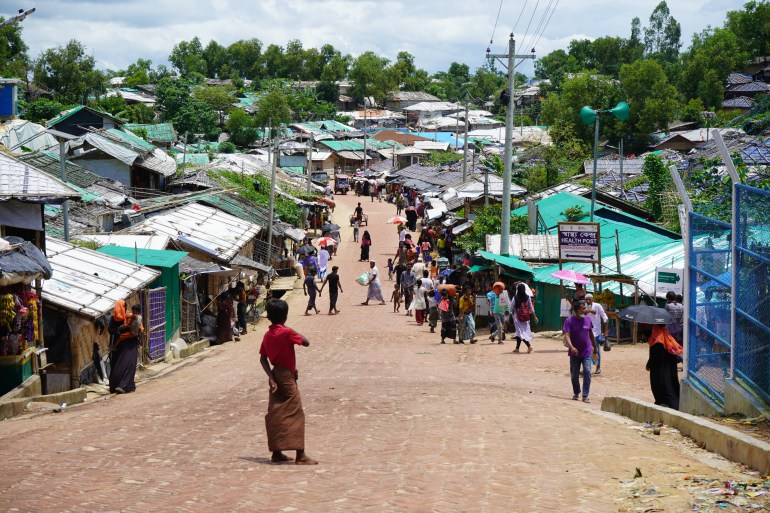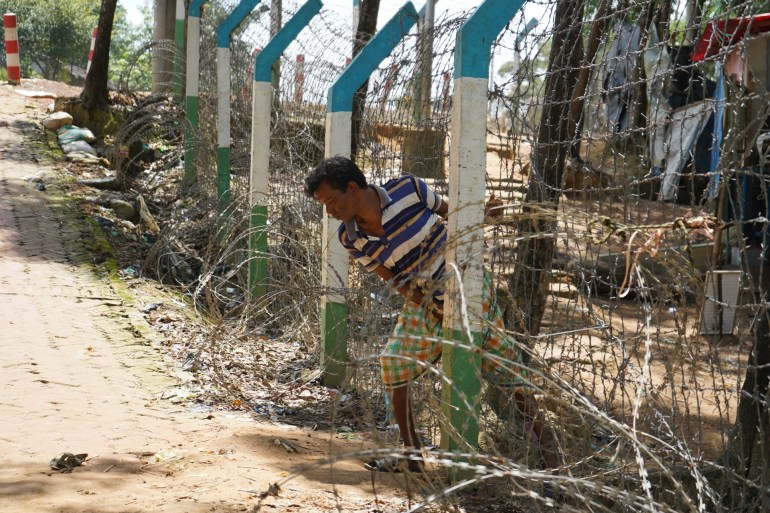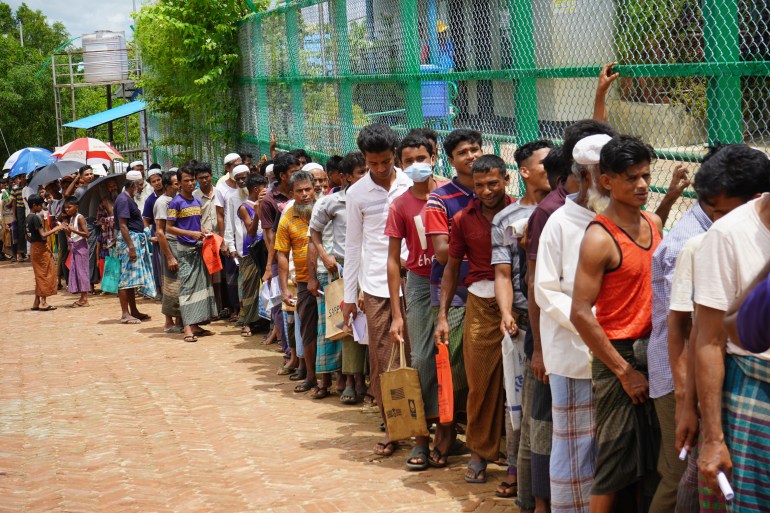Thu 25 August 2022:
Cox’s Bazar, Bangladesh – Rohingya people cannot be guaranteed safety in Myanmar, advocates say, where the government has been accused of decades of abuse that has left the long-persecuted ethnic minority largely stateless.
For the nearly one million Rohingya living in the world’s largest refugee settlement in neighbouring Bangladesh, conditions are squalid and what limited opportunities existed have slowly disappeared, rights groups and residents said.
On the fifth anniversary of Myanmar’s military operation that forced more than 740,000 Rohingya to flee the country, the dilemma of being unable to return home while struggling to survive in Bangladesh looms large for refugees in these labyrinth camps of tarpaulin and bamboo crowded together on terraced hills.
“We had enough, we want to go back to home to Myanmar soon,” Azra Khatun told Al Jazeera from the Balukhali refugee camp.
“So that our children can get some education and have a normal and decent life,” she said.
Two of Khatun’s three children were born in Bangladesh after she fled the 2017 military onslaught – a campaign that a United Nations fact-finding mission has said included mass murders of Rohingya civilians, gang rapes, and forced expulsions.
The violence indicated “genocidal intent”, the UN said, a finding that authorities in Myanmar have rejected.
Khatun’s children are also some of the 30,000 Rohingya babies born to the refugees each year in Bangladesh, according to Bangladeshi officials, a number that underscores the continued humanitarian demands of a refugee situation now defined as a “prolonged crisis” by the UN.

The Bangladesh government has become increasingly inhospitable to Rohingya refugees, advocates say, a situation that is being made worse by the country’s flagging economy, which has staggered under sky-high inflation and a cost of living crisis following Russia’s invasion of Ukraine on February 24.
“Bangladesh says it has done more than enough,” mother-of-three Khatun said.
“It is time for the UN and global community to assess the situation and try to resolve the problem soon,” she added.

A safe and dignified return to Myanmar remains a far-off hope for now.
So far, Rohingya refugees have not been willing to take part in a formal repatriation scheme created by Bangladesh and Myanmar in November 2017 – just three months after the brutal military campaign began, according to the International Crisis Group. The refugees wanted more guarantees about their safety, citizenship rights, and livelihoods.
During a recent trip to Bangladesh, UN human rights chief Michelle Bachelet said, “The current situation across the border means that the conditions are not right for returns.”
Sayeed Hossain was among a group of Rohingya refugees who met Bachelet during her visit to the camps on August 16.
“She assured us that our demands will be presented accordingly.”
In Myanmar, the Rohingya continue to face marginalisation and violence, according to human rights groups. Restrictions on the community have included limits on their ability to move around, access education and work opportunities, and even to limit the number of children they could have.
The Myanmar government has long maintained the Rohingya do not have ancestral ties to their homelands, but are instead the descendants of migrants from India and Bangladesh, a position challenged by historians.

About 600,000 members of the ethnic group remain in Myanmar, with about 130,000 of them living in internal displacement camps.
The prospect of repatriation from Bangladesh has been further complicated by the 2021 military coup and increased fighting between armed groups and Myanmar’s military in Rakhine state, home to most of the country’s Rohingya population.
“We can hear artillery rounds and machine fire almost every day. Our children and families are in panic,” Deen Mohammed, the camp leader of the only Rohingya camp located in the so-called no-man’s land on the Myanmar-Bangladesh border, known to locals as Zero Point, told Al Jazeera.
“We are unable to go to our own country still,” Mohammed said, adding that the fighting is also “getting very close to our camp area”.
Meanwhile, the humanitarian community faces a fund crunch made worse by the war in Ukraine, and of the $881m needed to support Rohingya refugees in Bangladesh through 2022, less than half has been funded.
“After five years, this is no longer the biggest crisis or the most covered crisis, so there are other situations in the world,” Regina de la Portilla, a UN refugee agency spokeswoman, told Al Jazeera.
“We need to find the funding for the Rohingya to continue living at least with a minimum standards,” she said.
“I think the main challenge is providing the support for them to survive on a day-to-day basis, the humanitarian needs are covered, but also moving towards what is going to happen next,” she added.At the centre of these challenges, many Rohingya say they feel left out of the process of finding solutions to their plight.
Jamalida Begum was also among the refugees to meet Bachelet during her visit. In a letter to the UN rights chief, she narrated how the Rohingya had fled atrocities, including women being raped and burned to death.
“There are still some Rohingya living in the Rakhine state, whose confiscated land is still not returned despite promises made by the Myanmar government,” she said.
“If they accept all our rights and demands, only then will we return to Myanmar.”
___________________________________________________________________________________________________________________________________________
FOLLOW INDEPENDENT PRESS:
TWITTER (CLICK HERE)
https://twitter.com/IpIndependent
FACEBOOK (CLICK HERE)
https://web.facebook.com/ipindependent
Think your friends would be interested? Share this story!





